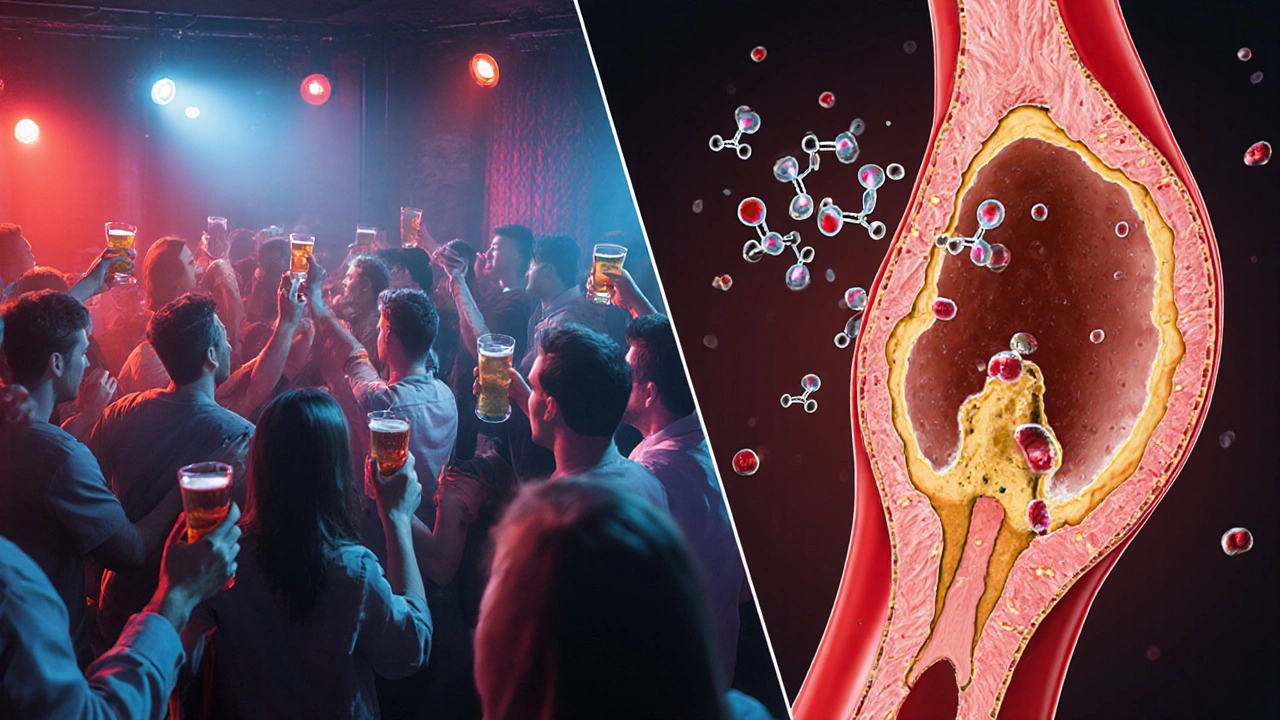Alcohol Risk Calculator
Heart Health Risk Assessment
Calculate your alcohol consumption risk level based on the article's findings about ischemia and heart health. Get personalized advice on how to reduce your risk.
Ever wondered why a night out can feel harmless one minute and leave you short‑of‑breath the next? The link between alcohol, reduced blood flow (ischemia), and overall heart health is more direct than you might think. Below you’ll find a clear, no‑fluff breakdown of what happens inside your body, how drinking patterns matter, and what you can do right now to keep your ticker in shape.
Quick Takeaways
- Alcohol can both widen and damage blood vessels, depending on dose and frequency.
- Moderate drinking may slightly lower heart‑attack risk, but binge drinking spikes ischemia and long‑term heart disease.
- Key risk factors amplified by alcohol include high blood pressure, raised LDL cholesterol, and atherosclerotic plaque build‑up.
- Watch for chest discomfort, unexplained fatigue, or sudden shortness of breath after heavy drinking.
- Small lifestyle tweaks-hydration, balanced meals, and limiting to one drink a day-can offset many of alcohol’s negative effects.
What Is Ischemia?
Ischemia is a condition where blood flow to an organ or tissue is insufficient to meet its metabolic needs. In the heart, this means the myocardium isn’t getting enough oxygen, which can trigger chest pain (angina) or, if prolonged, a heart attack.
The main culprits behind cardiac ischemia are narrowed coronary arteries, clots, or spasms that cut off the oxygen supply. Understanding how alcohol influences these mechanisms is the first step toward protecting your heart.

Alcohol’s Direct Interaction With Blood Vessels
Alcohol is a psychoactive compound that, once metabolized, enters the bloodstream and interacts with the lining of blood vessels (the endothelium). At low levels, it can cause a temporary vasodilation - the vessels widen, allowing a brief surge of blood flow. That’s why a glass of wine might feel relaxing and even improve circulation for a short period.
However, the same compound can become a toxin when consumed in excess. Chronic exposure leads to endothelial dysfunction, oxidative stress, and inflammation - all of which promote plaque formation and arterial stiffening.
In simple terms, one drink might give you a fleeting “blood‑pump” boost, but regular heavy drinking builds the roadblocks that cause ischemia.
Moderate Drinking vs. Binge Drinking - What the Numbers Say
| Pattern | Average Daily Alcohol (grams) | Effect on Blood Vessels | Ischemia Risk Change |
|---|---|---|---|
| Moderate (1‑2 drinks per day) | 10‑20g | Transient vasodilation; modest anti‑inflammatory effect | ~5% decrease in acute ischemic events (observational data) |
| Binge (≥5 drinks in ≤2hrs) | ≥60g | Endothelial injury, spikes in blood pressure, increased sympathetic activity | 2‑3× higher odds of myocardial ischemia within 24hrs |
| Heavy chronic (≥3 drinks daily) | 30‑40g | Progressive arterial stiffening, raised LDL, reduced HDL | 25‑30% increase in long‑term ischemic heart disease |
These figures come from large‑scale cohort studies conducted across Europe and North America between 2018‑2023. The take‑away is clear: the pattern matters far more than the total amount.
Long‑Term Effects on Overall Heart Health
When ischemia reoccurs, the heart muscle can suffer permanent damage, paving the way for broader cardiovascular disease, a group of disorders that includes coronary artery disease, heart failure, and arrhythmias.
Key pathways through which alcohol worsens heart health:
- Blood pressure spikes: Even a single binge episode can push systolic pressure up 10‑15mmHg, straining arterial walls.
- Unfavorable lipid profile: Heavy drinkers often show higher LDL (“bad”) cholesterol and lower HDL (“good”) cholesterol, a recipe for plaque buildup.
- Inflammation and oxidative stress: Acetaldehyde, a toxic by‑product of alcohol metabolism, damages the endothelium and encourages inflammatory cells to cling to vessel walls.
- Atrial fibrillation trigger: Alcohol can irritate the heart’s electrical system, leading to “holiday heart” episodes, which increase stroke risk.
Conversely, low‑to‑moderate intake of certain drinks-especially red wine-has been linked to higher levels of antioxidants like resveratrol, which may protect against plaque formation. The scientific consensus still warns that any benefit is outweighed by the risks if you exceed moderate limits.

Spotting the Warning Signs
Because ischemia can sneak up during or after a drinking session, knowing the red flags is crucial:
- Chest tightness or pressure that appears shortly after heavy drinking.
- Unexplained shortness of breath, especially when resting.
- Sudden fatigue, dizziness, or palpitations following a binge.
- Persistent heart‑rate irregularities (e.g., rapid fluttering) after alcohol consumption.
- Swelling in the ankles or feet, indicating the heart isn’t pumping efficiently.
If you notice any of these symptoms, seek medical attention promptly. Early detection of ischemic episodes can prevent permanent damage.
Practical Steps to Safeguard Your Heart
Want to keep enjoying a glass of wine without jeopardising your heart? Follow these evidence‑based habits:
- Set a personal limit: Aim for no more than 14g of pure alcohol per day for men and 10g for women (roughly one standard drink).
- Never drink on an empty stomach: Food slows alcohol absorption, reducing peak blood‑alcohol levels.
- Hydrate between drinks: A glass of water after each alcoholic beverage cuts total intake and eases the strain on your heart.
- Choose red wine or spirits over sugary mixed drinks: Fewer added sugars mean lower triglyceride spikes.
- Schedule alcohol‑free days: Giving your body a break at least twice a week restores endothelial function.
- Monitor blood pressure regularly: If you have hypertension, even moderate drinking can push numbers over the safe threshold.
- Stay active: Regular aerobic exercise improves HDL levels and counteracts alcohol‑induced inflammation.
Adopting these practices doesn’t require a total lifestyle overhaul-small, consistent changes make a big difference over time.
Frequently Asked Questions
Can a single binge episode cause permanent heart damage?
One binge can trigger acute ischemia and, if the heart muscle is starved of oxygen for too long, it may lead to irreversible injury. Even without a heart attack, repeated binging raises the probability of lasting scar tissue.
Is red wine really better for the heart than other alcoholic drinks?
Red wine contains polyphenols such as resveratrol, which have modest antioxidant effects. Studies show a small reduction in coronary events for moderate red‑wine drinkers, but the benefit disappears when consumption exceeds recommended limits. Spirits or beer lack these compounds, so the advantage is tied to the amount, not the type.
How does alcohol affect cholesterol?
Moderate drinking may raise HDL (“good”) cholesterol slightly, but heavy drinking raises LDL and triglycerides. The net effect depends on total alcohol intake and baseline lipid levels.
Is it safe to drink alcohol if I already have high blood pressure?
People with hypertension should limit themselves to the lowest possible intake-preferably none. Even moderate amounts can raise systolic pressure temporarily, increasing the risk of ischemic episodes.
What are the long‑term benefits of quitting alcohol for heart health?
Within weeks, blood pressure and heart rate normalize. After several months, LDL levels drop, HDL stabilises, and endothelial function improves, markedly decreasing the risk of future ischemia and heart disease.






James Lee
13 October, 2025 . 15:44 PM
i guess u think a glass o' wine is like, deep philosophy, but it's just buzz.
Dennis Scholing
17 October, 2025 . 01:44 AM
Dear readers, it is imperative to understand that moderation in alcohol consumption is a cornerstone of cardiovascular health. While the article outlines the risks associated with excessive intake, I would like to emphasize the importance of individualized assessment when establishing safe limits. A balanced approach, complemented by regular medical check‑ups, will serve you well.
Kasey Lauren
20 October, 2025 . 11:44 AM
Hey folks! Just wanted to say that keeping a drink or two in check can totally help your heart stay happy. Small steps, big smiles!
joshua Dangerfield
23 October, 2025 . 21:44 PM
Interesting how the data ties binge patterns to spikes in ischemic risk-makes you think about your own weekend habits. It’s cool to see science backing up the gut feeling that “less is more” when it comes to the sauce.
Abhimanyu Singh Rathore
27 October, 2025 . 06:44 AM
Behold! The tragic opera of the heart-each extra gulp a thunderous drumbeat of doom!
One must stare into the abyss of those glassy temptations and proclaim, “Enough!” lest the curtain fall prematurely.
Stephen Lewis
30 October, 2025 . 16:44 PM
Esteemed community, I concur with the article's premise that alcohol, when consumed beyond recommended thresholds, imposes undue stress upon myocardial tissue. It is prudent to adhere to established guidelines to mitigate such hazards.
janvi patel
3 November, 2025 . 02:44 AM
Honestly, I don’t see why everyone makes a fuss over a few drinks; the heart is stronger than we give it credit for.
Lynn Kline
6 November, 2025 . 12:44 PM
💪🌟 Remember, your heart is a superhero-fuel it with the right choices! Swap that extra pint for a vibrant walk and feel the power surge! 🌈🚶♀️
Rin Jan
9 November, 2025 . 22:44 PM
When we sit down to contemplate the delicate symphony that is our circulatory system, we must first acknowledge the profound responsibility each individual bears toward the fragile vessels that tirelessly pump life‑blood through our mortal frames. The article presents a stark reminder that alcohol, though socially celebrated, can act as a pernicious infiltrator, eroding the very foundations of cardiac resilience. It is not merely about the number of drinks; it is about the insidious patterns-daily indulgence, weekend binges-that stealthily compromise endothelial integrity.
Consider the physiological cascade: ethanol metabolism generates reactive oxygen species, which in turn assault the nitric oxide pathways essential for vasodilation. The resultant endothelial dysfunction seeds the fertile ground for ischemic events. Moreover, chronic overconsumption elevates systemic blood pressure, a silent tyrant that forces the heart to labor under duress, ultimately precipitating hypertrophic remodeling.
We are also called to reflect upon the sociocultural narratives that glorify excess. The celebratory clink of glasses must not eclipse the quiet whisper of caution ringing in our conscience. Each sip should be weighed against the potential cost-an irreversible scar on the myocardial landscape.
Therefore, let us adopt a stance of mindful moderation. Reserve alcohol for moments of genuine joy, interspersed with days of abstinence, allowing the vascular endothelium the grace of recovery. Engage in regular aerobic activity, champion a diet rich in antioxidants, and seek routine medical evaluation to monitor cardiac markers.
In doing so, we honor the sanctity of our hearts, transforming them from vulnerable vessels to steadfast fortresses capable of withstanding the tempests of life.
Jessica Taranto
13 November, 2025 . 08:44 AM
Fascinating exposition on alcohol’s impact; I appreciate the thorough breakdown. It certainly adds depth to my own considerations about occasional drinks.
akash chaudhary
16 November, 2025 . 18:44 PM
Let’s be crystal clear: the data doesn’t lie. Heavy drinking spikes ischemic risk, period. Anyone still defending binge culture is ignoring hard evidence and endangering lives.
kenneth strachan
20 November, 2025 . 04:44 AM
Wow, another melodramatic scare‑tale about booze, huh? I mean, sure, don’t overdo it, but let’s not act like a single glass will doom you.
Mandy Mehalko
23 November, 2025 . 14:44 PM
Hey all! Just wanted to add a bright note-tiny changes, like cutting back a drink, can lead to a big happy heart. Keep shining!